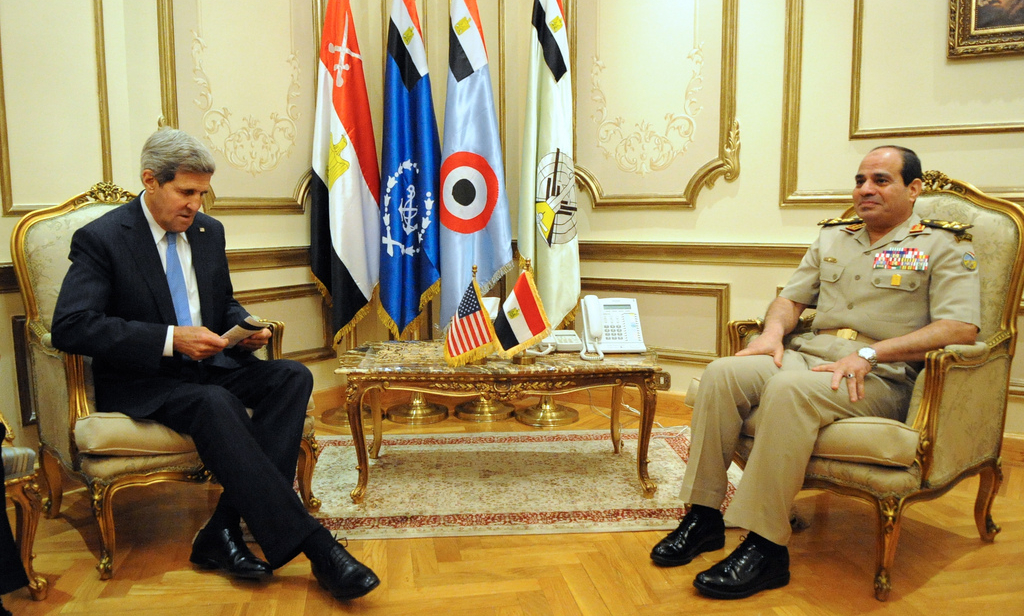Fixing U.S. Policy Toward Foreign Military Coups

Editor’s Note: Coups frequently topple both democratic and authoritarian regimes, but the U.S. response to these seizures of power is inconsistent at best. Austin Matthews of East Carolina University explains the sources of U.S. policy toward coups and offers a range of reforms that could help the United States be more consistent and more effective in its response.
Daniel Byman
***
U.S. policy on foreign military coups is suffering from a credibility crisis. Successive administrations have failed to formally condemn half of these events since 2009. Due to the simultaneous vagueness and rigidity in appropriations language that is supposed to punish coup regimes, U.S. administrations have failed in many cases to “call a coup a coup.” How can the United States rationalize calling what happened in 2021 in Guinea a “coup,” while officially bypassing any mention of a similar coup months earlier in Chad? This rhetorical hedging has the effect of making the U.S. commitment to safeguarding global democracy look, at best, inconsistent and, at worst, conditional.
The United States has failed to formally condemn 12 of the 24 foreign military coups that have occurred since 2009. Coups are inherently unconstitutional, harmful to civilians, and a leading factor in global democratic backsliding. Given President Biden’s warning that a “battle between democracy and autocracy” is a defining struggle of our era, confronting military coups should be a top priority for U.S. foreign policy. Unfortunately, weak legislative language has sabotaged the United States’ opportunity to act as a champion in confronting these authoritarian actions.
Although the government’s current policy toward foreign military coups is frail, it can be repaired. There are three statutory issues contributing to administrative hedging: the lack of a clear definition of “coup,” language that overlooks coups in autocratic countries, and compulsory sanctions that incentivize administrations to avoid acknowledging coups when they occur. These issues could be corrected with a reformed legislative process that would help ensure greater credibility, transparency, and flexibility of action toward military coups. These changes would push the United States to denounce military coups with conviction, while preserving the administration’s ability to strategically evaluate sanction responses based on humanitarian and geopolitical considerations.
U.S. Legislation on Foreign Military Coups
U.S. policy on military coups was not legislated until 1984, when it was introduced as a clause in an appropriations bill to limit foreign aid. Initially, the law on coups applied only to El Salvador. It specifically stipulated that if the president of El Salvador was deposed by a military coup, all congressional funds to the country would be suspended.
The appropriations statute on military coups evolved over the years but has maintained its basic spirit of protecting democracy and punishing military seizures of political power. A 1986 version of the statute extended the El Salvador provisions to also protect the “civilian government” of Guatemala, before finally being applied to all countries receiving U.S. foreign assistance. Public Law 100-202 of 1987 also amended a previous statute to codify conditions for the post-coup resumption of congressional foreign assistance. This law required the president to certify to Congress that democratic governance in the sanctioned country had resumed, upon which allocated aid would be continued.
U.S. coup legislation is currently enshrined in Section 7008 of the Consolidated Appropriations Act, which states specifically that any country whose duly elected head of government is deposed by a military coup d’état or decree shall automatically be prohibited from receiving a broad package of congressionally appropriated foreign assistance. Economic and security assistance are the most affected obligations, but democracy-building aid is statutorily excluded from being part of the sanctions.
The most recent statutory change was the incorporation of a waiver in the 2023 Consolidated Appropriations Act. This allows for sanctions to be reviewed case by case, even if a coup is identified by the administration. For this provision to be used, though, the secretary of state must certify to Congress that waiving the restrictions is in the interest of U.S. national security. The waiver does not appear to have been used yet, but it does provide the administration with some leeway in declaring an event a coup without having to activate the automatic sanctions.
Unfortunately, the United States’ application of its own legislation has been wildly inconsistent for decades. Experts have identified 24 successful military coups worldwide since 2009, which have been met with wildly inconsistent responses by the Obama, Trump, and Biden administrations. Eight were properly identified by the State Department, and foreign assistance to the countries where the coup had taken place was suspended. Four took place in countries already under congressional sanctions for previous successful military coups. But, most concerningly, 12 military coups—Algeria 2019, Armenia 2018, Bolivia 2019, Burkina Faso 2014, Chad 2021, Egypt 2011 and 2013, Honduras 2009, Maldives 2012, Niger 2010, Tunisia 2011, and Zimbabwe 2017—were explained away or not even acknowledged by administration officials. In some cases, this aversion was in part to avoid these statutory restrictions on aid.
There are three main issues harming U.S. foreign policy by creating statutory loopholes and political incentives to avoid calling out coups when they occur. Rectifying these problems would make U.S. policy more consistent on foreign military coups.
Three Statutory Issues to Address
Issue 1: “Coup” does not have a statutory definition.
The first issue is that existing legislation doesn’t even define a coup. Rather, the Consolidated Appropriations Act merely references the term and then shifts to describing sanctions consequences and waiver conditions. Without a clear definition, interpretation is left to individuals across administrations who may vary in their understanding and application of the law. Even experts are divided on how to identify a coup, so the built-in uncertainty created by a lack of definition only helps to undermine the spirit of the law.
The simplest fix is to amend the legislation with a clear definition of “military coup.” Any statutory definition should include a set of observable conditions that leave little room for misinterpretation or malfeasance. Recent scholarly literature provides a model for such a conditions-based definition, emphasizing unconstitutional action and perpetrator identity. Rather than allowing a military coup to be dubiously framed as a “situation” or skirted completely, a clear statutory definition would protect the law from “semantic contortions.”
Issue 2: Most coup targets are not “duly elected.”
The second issue is that, based on the legislation’s current wording, most coups in the world would not technically require a congressional response. That is because the legislation only sanctions military coups against “duly elected” heads of government. But coups don’t just target the duly elected—rather, they overwhelmingly oust autocrats. This statutory language excuses the United States from a formal response in most cases, potentially allowing new autocrats to bypass immediate scrutiny.
President Emmerson Mnangagwa of Zimbabwe benefited from this as the world turned a “blind eye” following his 2017 coup, which ousted longtime autocrat Robert Mugabe. The coup was not denounced by the Trump administration. Secretary of State Rex Tillerson went so far as to call the military seizure of power a “historic moment.” The rationale for non-application of the law was that Mugabe’s election in 2013 “did not represent the will of the Zimbabwean people.” Mugabe’s lack of democratic mandate precluded sanctions against the military conspiracy that replaced him.
Autocrats old and new should not be protected by the United States. Omitting military coups against dictators from statutory sanction only provides cover for newly installed autocrats, who typically are not eager to usher in democratic reforms. A foreign policy that advocates for global rule of law should not shy away from clearly identifying military seizures of power, no matter the target of the action.
Issue 3: Automatic sanctions incentivize rhetorical hedging.
The third issue with coup legislation is that the automatic sanctions triggered by public identification leave the administration with little flexibility in how to respond. Because U.S. officials know that foreign assistance will be statutorily suspended if a “coup” designation is assigned to a partner regime, administrations have hedged with vague or misleading statements. Such was the case in 2013, when Egypt’s democratically elected president was overthrown in a clear military coup. Policy observers and even late-night comedians at the time criticized the mental acrobatics of Obama administration officials, who referenced “unrest” in a series of milquetoast statements.
Decoupling automatic sanctions from formal coup identification would give administrations increased flexibility in how they respond while also ensuring that they formally condemn these actions when appropriate. Context matters when selecting how to respond to emergency situations abroad, including military coups. Increased flexibility would allow the Department of State to better prioritize the needs of women, children, minorities, and other vulnerable groups. It would also ensure that certain forms of foreign assistance aren’t withheld from states undergoing humanitarian crises, where the suspension of aid could worsen human suffering.
Creating a More Credible, Transparent, and Flexible Policy Toward Coups
Recognizing the statutory issues above, the next congressional appropriations negotiations should consider enshrining in law a revised process for identifying and sanctioning foreign military coups and develop a new process for action if a coup occurs.
Step 1: Once a potential military coup has taken place, the congressional appropriations or foreign affairs committees or the administration may request an urgent review of the facts of the situation. Currently, any review is contingent on the administration’s initiative, but Congress should also have a role given the place of appropriations in the response. This partnership would ensure that military coups in locations of U.S. strategic interest don’t receive a pass from national scrutiny, even if it would be more geopolitically convenient for an administration to hedge on condemnation or ignore the situation entirely.
Step 2: After a review has been requested by Congress or the administration, the Department of State should then convene a panel of experts to expeditiously assess whether a successful military coup has taken place. This panel of experts would collect facts to apply the statutory definition in a formal evaluation, which would be reported and certified by the secretary of state to congressional appropriations committees. Certification is important for transparency, ensuring that the administration’s judgment is subject to legislative scrutiny. If the panel rules in the affirmative, the secretary also should be obligated to issue a formal condemnation on behalf of the U.S. government to reflect the national position on the breach of democratic norms.
Step 3: If the administration certifies to Congress that a coup has taken place and releases an appropriate public denunciation, the Department of State would then be authorized to begin a review of potential sanctions on appropriated funds. Critically, sanctions would not be imposed automatically upon certification or condemnation. It would instead be the administration’s prerogative to determine the most appropriate response based on the humanitarian and security situation in the affected country. This decoupling of recognition and sanctions would help ensure that statutory procedure does not inhibit an accurate assessment of the situation.
Military coups continue to be a major threat to international security, particularly in some of the most vulnerable regions of the world. As a potentially powerful force in the global democratic movement, the United States should be a champion of democracy and government legitimacy when it comes to unconstitutional seizures of political power by military actors and their civilian allies. Although current U.S. policy toward coups is broken, a revised statutory process can help to fix it. Greater clarity on the terminology, the involvement of both the administration and Congress in making determinations, and decoupling condemnation and sanctions would help the United States regain credibility on the issue by obligating the U.S. government to take a public position demanding a return to democracy, while leaving room for flexibility in shaping a response that is constructive for human rights protection.


.jpg?sfvrsn=d27bd863_5)

